Title: "Chinese Bitcoin Miners Find a New Crypto Haven in Ethiopia"
Authors: David Pan, Fasika Tadesse, Bloomberg
Translator: Carl, Techub News

Last spring, shipping containers began to appear near the substations of the Grand Ethiopian Renaissance Dam, Africa's largest, containing many high-power, high-energy-consuming Bitcoin mining machines.
This indicates that Chinese Bitcoin miners, who were expelled more than two years ago, have been continuously seeking places with cheap electricity and friendly regulations from one country to another, and have now arrived in Africa.
Affected by political and economic setbacks, Chinese Bitcoin miners have been attracted by some governments with low electricity costs and cryptocurrency-friendly policies. Although Ethiopia still prohibits cryptocurrency trading, it has allowed Bitcoin mining since 2022 and has strengthened its relationship with China over the past decade, with several Chinese companies helping to build a $4.8 billion dam from which miners plan to obtain electricity.
Giant Dam in Ethiopia
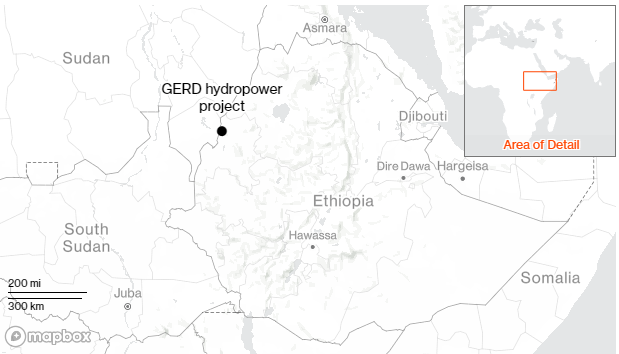
For all companies engaged in cryptocurrency mining, Ethiopia has become a rare opportunity, as climate change and scarce electricity have led to strong resistance to cryptocurrency mining elsewhere. Ethiopia has a special appeal to Chinese companies that once dominated Bitcoin mining but now struggle to compete with current rivals in Texas.
In 2021, the Chinese government banned Bitcoin mining, abruptly halting China's status as a Bitcoin mining center and forcing dozens of companies to leave.
For these companies and Ethiopia, this is also a risky gamble. A series of developing countries such as Kazakhstan and Iran initially accepted Bitcoin mining, but they also began to shift when their energy use could lead to domestic discontent.
Jaran Mellerud, CEO of Hashlabs Mining, said, "First, countries may exhaust available electricity, leaving miners with no room for expansion. Second, miners may suddenly become unwelcome to the government and be forced to leave."
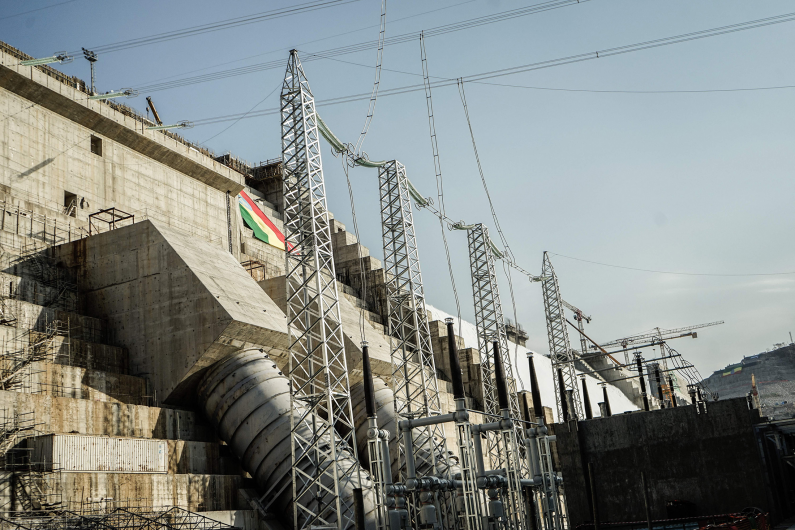
Almost half of Ethiopia's population lacks access to electricity, making cryptocurrency mining a tricky subject. Photographer: Amanuel Sileshi/AFP/Getty Images
Industry executives, who declined to be named to avoid jeopardizing government relations, said Ethiopian officials are cautious about the controversy surrounding Bitcoin mining. Even after the new electricity comes online, almost half of Ethiopia's population still lacks access to electricity, making cryptocurrency mining a delicate issue. But at the same time, it is also a potential source of lucrative foreign exchange.
According to estimates from cryptocurrency mining service provider Luxor Technology, Ethiopia has become one of the world's largest recipients of Bitcoin mining machines. Ethan Vera, COO of Luxor Technology, said Luxor reached a major deal to ship equipment to the country in September.
The Ethiopian Electric Power Corporation stated that it has reached power supply agreements with 21 Bitcoin miners, 19 of which are from China.
Nuo Xu, founder of the China Digital Mining Association, said, "Ethiopia will become one of the most welcoming destinations for Chinese miners." The association organizes exhibitions and promotes mining machine transactions, and he is arranging a group of Chinese mining executives to visit Ethiopia.
Emerging Market for Bitcoin Mining
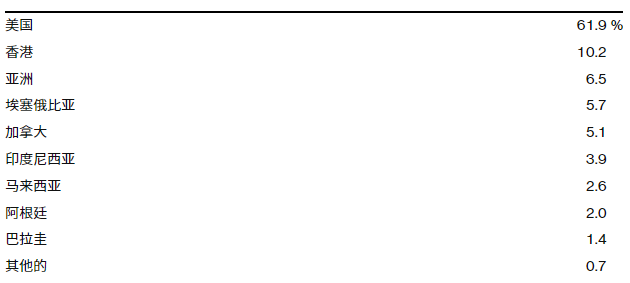
Source: Luxor Logistics
This table shows the market share of Luxor's clients in various countries in 2023. Hong Kong is a transit hub for shipments to other markets.
The willingness of Bitcoin miners to ship equipment worth tens of millions of dollars to a country that has just emerged from a civil war in the north demonstrates the concerning political and economic environment they are in.
Bitcoin mining machines consume a large amount of electricity, so obtaining cheap electricity is a key competitive advantage, with electricity accounting for up to 80% of mining operating costs. The Cambridge Centre for Alternative Finance (CCAF) estimates that Bitcoin mining consumed 121 terawatt-hours of electricity in 2023, equivalent to Argentina's electricity consumption.
This is why the low-cost electricity has determined where miners have placed most of their equipment in the past few years: first in China, then in Iran, Kazakhstan, Russia, and northern Sweden, and most recently in Texas. The common denominator in these places is cheap energy prices.
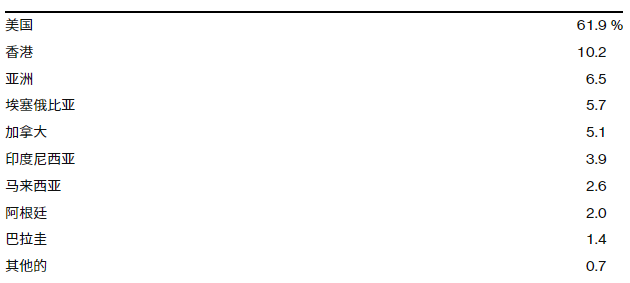
A Bitcoin mining farm in Kazakhstan. Photographer: Meiramgul Kussainova/Anadolu Agency/Getty
The reliance on abundant electricity is also a major weakness, as it may pit miners against factories and households for electricity, leading them to face political resistance.
Alen Makhmetov, co-founder of Hashlabs, said that when Kazakhstan imposed new restrictions and taxes on miners, it essentially killed the entire industry. Two years later, Kazakhstan still has 10 megawatts of idle power facilities.
Against the backdrop of global warming, although miners claim they are increasingly using clean energy, Bitcoin mining is increasingly seen as a factor in global warming. A study released by the United Nations in October last year estimated that two-thirds of the electricity used for Bitcoin mining in 2020 and 2021 was generated from fossil fuels.
Cheap Electricity
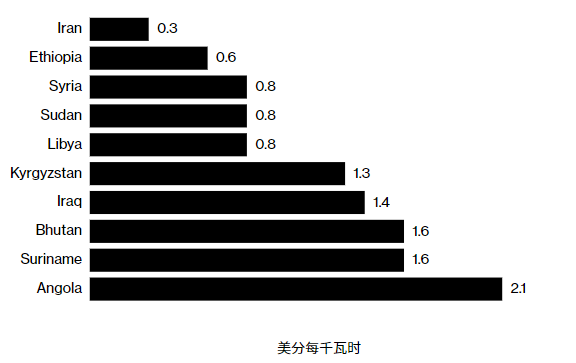
Global household electricity prices in June 2023, source: Statista Research Department
Yodahe A. Zemichael, Deputy Director of the Ethiopian Information Network Security Agency, stated that the Ethiopian government allows Bitcoin mining mainly because these companies pay for their electricity consumption in foreign currency.
Yodahe A. Zemichael used terms such as "high-performance computing" and "data mining" in his written response, rather than Bitcoin mining.
Nemo Semret, CEO of local miner QRB Labs, said Ethiopia is subject to strict regulation, and he helped persuade officials to allow Bitcoin mining. "Introducing cryptocurrency mining has been a huge challenge, and for the past two years, we have been working hard to obtain all the necessary permits from the government."
Yodahe stated that the government has issued a directive to regulate cryptocurrency products, including mining, and the issuance of licenses "is being done in a sandbox and is still in the early stages." But he refused to disclose how many licenses have been issued so far and whether the directive has been shared with industry participants.
Semret said miners remain skeptical about how the authorities will conduct long-term regulation.
However, for Bitcoin miners, especially Chinese miners, Ethiopia represents a unique combination of economic and political advantages. Some executives even see it as a potential competitor to Texas, which accounts for about a quarter of the global Bitcoin hash rate.
Ideal Climate Conditions
An executive from Bitmain stated that Ethiopia's ability to provide power for Bitcoin mining may rival that of Texas within a few years. The completion of the GERD project will increase Ethiopia's generating capacity to 5.3 gigawatts, with 92% coming from renewable hydroelectric power.
The Ethiopian Electric Power Corporation stated that once the GERD is fully completed, Ethiopia's generating capacity will double. Hiwot Eshetu, the company's Director of Marketing and Business Development, stated in an interview that the company charges Bitcoin miners a fixed rate of 3.14 cents per kilowatt-hour.
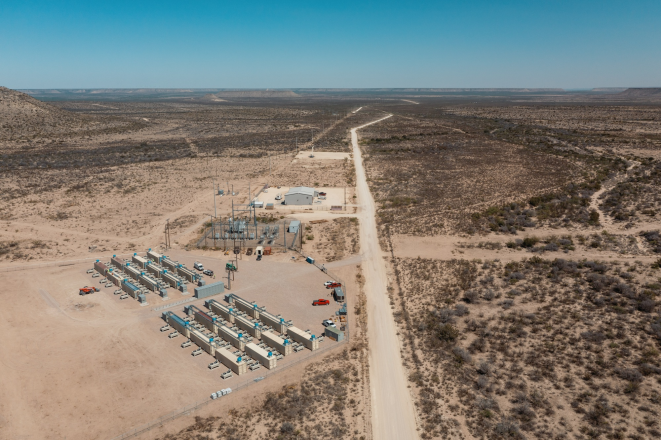
A Bitcoin mining facility under construction in Texas. Photographer: Jordan Vonderhaar/Bloomberg
Vera from mining service provider Luxor stated that while this is similar to the average level in Texas, the rates may fluctuate significantly, making profits in the state more difficult to predict.
Hiwot from the Ethiopian Electric Power Corporation stated that in Ethiopia, prices decrease once miners are directly connected to the power plants. Currently, the company has suspended signing new contracts to ensure good control and management of the process.
BWP has been shipping equipment to Ethiopia since early last year, operated by Chinese and other country miners. In December last year, the company announced on X that it would open a 120-megawatt mining equipment data center in the capital, Addis Ababa, a scale that is quite large even by Texas standards.
Vitaliy Borshenko, CEO of BWP, stated that Ethiopia's advantage lies not only in cheap renewable energy. He cited advice from mining machine manufacturer Bitmain, stating that the ideal temperature for mining is 5 to 25 degrees Celsius, which aligns perfectly with Ethiopia's average temperature.

Nuo Xu, founder of the China Digital Mining Association, stated that this temptation has led some Chinese companies to operate without waiting for official approval. "Miners disguise themselves as factories or agricultural companies to obtain electricity, rather than seeking government approval for mining." Yodahe did not respond to requests for comment on such practices.
The confidence of Chinese miners is supported by geopolitics. China is Ethiopia's largest source of foreign direct investment and its largest bilateral creditor. The Ethiopian Ministry of Finance stated in December last year that from 2006 to 2018, the Chinese government and financial institutions provided nearly $15 billion in loans for 70 large projects in the country.
免责声明:本文章仅代表作者个人观点,不代表本平台的立场和观点。本文章仅供信息分享,不构成对任何人的任何投资建议。用户与作者之间的任何争议,与本平台无关。如网页中刊载的文章或图片涉及侵权,请提供相关的权利证明和身份证明发送邮件到support@aicoin.com,本平台相关工作人员将会进行核查。




